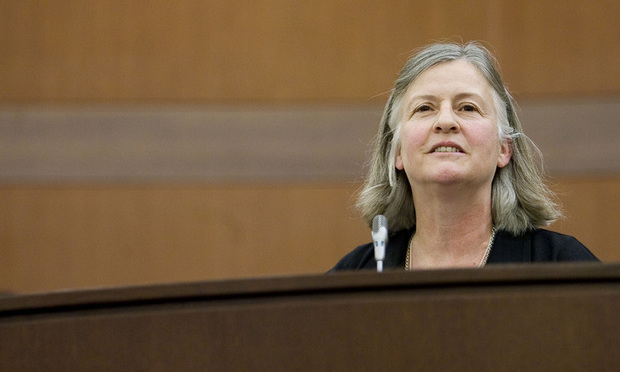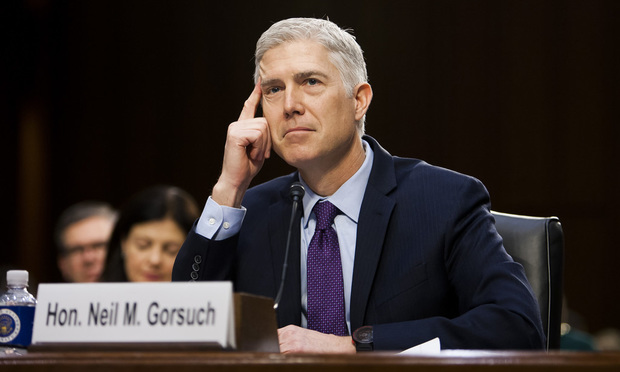SCOTUS Review Urged On Judge Selection Process Amid Circuit Split
"The circuit split also leaves an intolerable cloud of uncertainty for Delaware and other states that rely on political balance in their judicial selection processes, including fifteen other states that use political balancing in forming their judicial nominating commissions," former governors contend in a brief.
October 15, 2019 at 09:00 AM
5 minute read
The original version of this story was published on National Law Journal
 Virginia Seitz of Sidley Austin. Photo: Diego M. Radzinschi / ALM
Virginia Seitz of Sidley Austin. Photo: Diego M. Radzinschi / ALM
Former Delaware governors and two former state Supreme Court chief justices are urging the U.S. Supreme Court to review a federal appellate court decision that ruled unconstitutional a judicial appointment process that effectively limits service on the bench to Republicans and Democrats.
The Delaware governor, John Carney, is challenging the ruling from the U.S. Court of Appeals for the Third Circuit, and this week he won support in friend-of-the-court briefs.
The amicus brief on behalf of the former governors, filed by Theodore Mirvis of Wachtell, Lipton, Rosen & Katz, and one on behalf of two former chief justices, represented by Sidley Austin's Virginia Seitz, aim to bolster Carney's argument that the state constitution's "political balance" requirements for selection of judges does not violate the First Amendment.
"The means Delaware has chosen to achieve a politically balanced judiciary—the selection of judges based on party affiliation—is common practice in most other states and in the federal system," Seitz wrote. "The decision here is vitally important because it has implications for, and indeed opens to question, all such selection processes."
A unanimous panel of the appellate court in April ruled that Delaware's judicial selection process violates the First Amendment by prohibiting the governor from appointing a judge due to his or her "affiliation with a particular political party."
The political balance requirements limit judges affiliated with any one political party to no more than a "bare majority" on the state's three highest courts, with the other seats reserved for judges affiliated with the "other major political party."
Delaware lawyer James Adams, an Independent, argued the requirements effectively limit service on state courts to members of the Democratic and Republican parties. Those requirements, he argued, restrict a judicial candidate's First Amendment freedom to associate with the political party of their choice.
Central to the Third Circuit decision were two U.S. Supreme Court decisions that confronted when political party affiliation is an appropriate condition of employment and an exception for "policymakers": Elrod v. Burns and Branti v. Finkel.
"The purpose of the policymaking exception [to Elrod and Branti] is to ensure that elected officials may put in place loyal employees who will not undercut or obstruct the new administration," Judge Julio Fuentes of the U.S. Court of Appeals for the Third Circuit said in February's ruling. "Judges simply do not fit this description. To the extent that Delaware judges create policy, they do so by deciding individual cases and controversies before them, not by creating partisan agendas that reflect the interests of the parties to which they belong."
Two former Delaware chief justices—Myron Steele, a Democrat, and E. Norman Veasey, a Republican—contend in their amicus brief that the Third Circuit misunderstood Elrod and Branti.
"Those decisions address when political party affiliation may be considered in selecting executive and legislative branch employees," Seitz wrote in the brief on behalf of Steele and Veasey. "They do not address the relevant constitutional history and tradition of judicial appointments, which reflect the judgment that judges should be accountable to the people (in varying degrees depending on the mode of selection) as well as independent in the execution of their role. Nothing in Elrod and Branti suggests that that judgment and longstanding tradition violate the First Amendment."
Wachtell's Mirvis, on behalf of the five most recent former governors, argued the appellate court made an "unprecedented expansion" of the high court's anti-patronage decisions and created a circuit split.
"The circuit split also leaves an intolerable cloud of uncertainty for Delaware and other states that rely on political balance in their judicial selection processes, including fifteen other states that use political balancing in forming their judicial nominating commissions," Mirvis wrote in his brief.
Adams is represented by David Finger of Wilmington's Slanina & Finger. Finger opened his brief in the U.S. Supreme Court—filed this week—with quotes by the late Justice Antonin Scalia and Justice Neil Gorsuch. The brief urged the justices not to disturb the Third Circuit's ruling.
 Neil Gorsuch testifies at his confirmation hearing in March 2017. Photo: Diego M. Radzinschi/ NLJ
Neil Gorsuch testifies at his confirmation hearing in March 2017. Photo: Diego M. Radzinschi/ NLJGorsuch was quoted from confirmation hearing, at which the nominee claimed: "There is no such thing as a Republican judge or a Democratic judge. We just have judges in this country."
The Third Circuit, Finger argued, did not misunderstand the Elrod-Branti decisions. The governor only disagrees with the appellate court's application of those principles, wrote Finger.
"The issue of political balance on Delaware's courts was decided by the Third Circuit on state law grounds," Finger's brief said. "Matters of state law are not a proper basis to grant a writ of certiorari."
Adams is supported in the high court by Joel Friedlander of Wilmington's Friedlander & Gorris. Friedlander, who wrote a law review article on the Delaware constitution's requirements, said in his amicus brief: "The major party provision operates as a bipartisan lockup of Delaware's judiciary. A small party cannot hope to get any of its members appointed to the judiciary, even if the small party is allied with a major party. This is a severe burden on associational rights."
Carney is represented pro bono in the high court by Michael McConnell, senior of counsel at Wilson Sonsini Goodrich & Rosati. McConnell, a former judge on the Tenth Circuit, leads the Constitutional Law Center at Stanford Law School.
This content has been archived. It is available through our partners, LexisNexis® and Bloomberg Law.
To view this content, please continue to their sites.
Not a Lexis Subscriber?
Subscribe Now
Not a Bloomberg Law Subscriber?
Subscribe Now
NOT FOR REPRINT
© 2025 ALM Global, LLC, All Rights Reserved. Request academic re-use from www.copyright.com. All other uses, submit a request to [email protected]. For more information visit Asset & Logo Licensing.
You Might Like
View All

Bitcoin Mining Company That Enlisted Davis Polk Beats Investor Class Action
4 minute read
Binance Sued After $30 Million in Crypto Stolen and Allegedly Laundered on Platform
3 minute readTrending Stories
- 1Law Firms Expand Scope of Immigration Expertise, Amid Blitz of Trump Orders
- 2Latest Boutique Combination in Florida Continues Am Law 200 Merger Activity
- 3Sarno da Costa D’Aniello Maceri LLC Announces Addition of New Office in Eatontown, NJ, and Named Partner
- 4Friday Newspaper
- 5Public Notices/Calendars
Who Got The Work
J. Brugh Lower of Gibbons has entered an appearance for industrial equipment supplier Devco Corporation in a pending trademark infringement lawsuit. The suit, accusing the defendant of selling knock-off Graco products, was filed Dec. 18 in New Jersey District Court by Rivkin Radler on behalf of Graco Inc. and Graco Minnesota. The case, assigned to U.S. District Judge Zahid N. Quraishi, is 3:24-cv-11294, Graco Inc. et al v. Devco Corporation.
Who Got The Work
Rebecca Maller-Stein and Kent A. Yalowitz of Arnold & Porter Kaye Scholer have entered their appearances for Hanaco Venture Capital and its executives, Lior Prosor and David Frankel, in a pending securities lawsuit. The action, filed on Dec. 24 in New York Southern District Court by Zell, Aron & Co. on behalf of Goldeneye Advisors, accuses the defendants of negligently and fraudulently managing the plaintiff's $1 million investment. The case, assigned to U.S. District Judge Vernon S. Broderick, is 1:24-cv-09918, Goldeneye Advisors, LLC v. Hanaco Venture Capital, Ltd. et al.
Who Got The Work
Attorneys from A&O Shearman has stepped in as defense counsel for Toronto-Dominion Bank and other defendants in a pending securities class action. The suit, filed Dec. 11 in New York Southern District Court by Bleichmar Fonti & Auld, accuses the defendants of concealing the bank's 'pervasive' deficiencies in regards to its compliance with the Bank Secrecy Act and the quality of its anti-money laundering controls. The case, assigned to U.S. District Judge Arun Subramanian, is 1:24-cv-09445, Gonzalez v. The Toronto-Dominion Bank et al.
Who Got The Work
Crown Castle International, a Pennsylvania company providing shared communications infrastructure, has turned to Luke D. Wolf of Gordon Rees Scully Mansukhani to fend off a pending breach-of-contract lawsuit. The court action, filed Nov. 25 in Michigan Eastern District Court by Hooper Hathaway PC on behalf of The Town Residences LLC, accuses Crown Castle of failing to transfer approximately $30,000 in utility payments from T-Mobile in breach of a roof-top lease and assignment agreement. The case, assigned to U.S. District Judge Susan K. Declercq, is 2:24-cv-13131, The Town Residences LLC v. T-Mobile US, Inc. et al.
Who Got The Work
Wilfred P. Coronato and Daniel M. Schwartz of McCarter & English have stepped in as defense counsel to Electrolux Home Products Inc. in a pending product liability lawsuit. The court action, filed Nov. 26 in New York Eastern District Court by Poulos Lopiccolo PC and Nagel Rice LLP on behalf of David Stern, alleges that the defendant's refrigerators’ drawers and shelving repeatedly break and fall apart within months after purchase. The case, assigned to U.S. District Judge Joan M. Azrack, is 2:24-cv-08204, Stern v. Electrolux Home Products, Inc.
Featured Firms
Law Offices of Gary Martin Hays & Associates, P.C.
(470) 294-1674
Law Offices of Mark E. Salomone
(857) 444-6468
Smith & Hassler
(713) 739-1250







